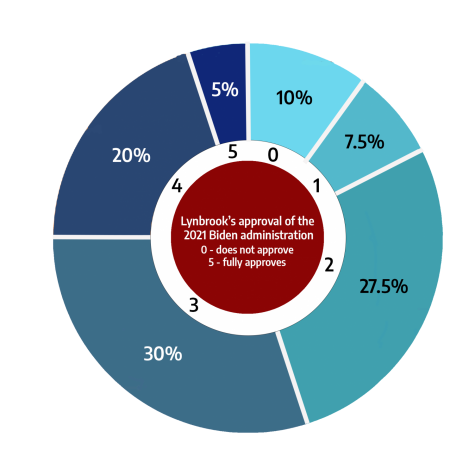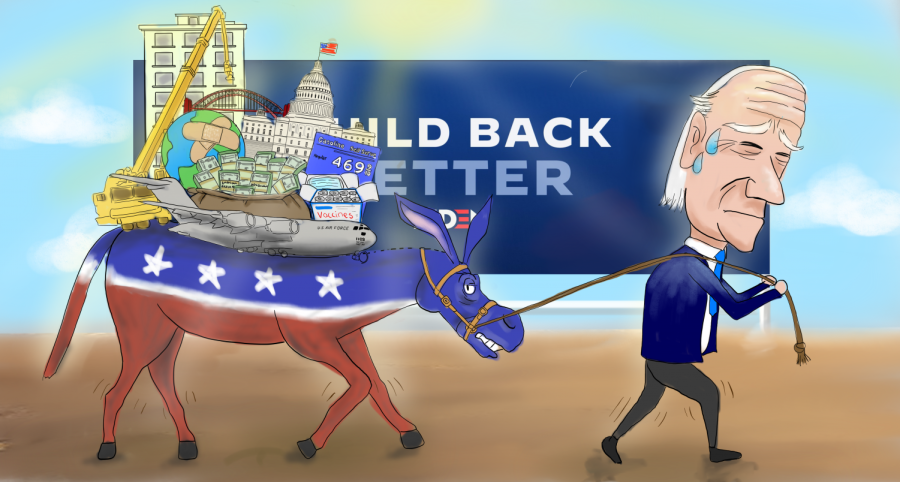BBB: Biden Be Better
Graphic illustration by Catherine Zhou
Though Biden’s presidency started swtrong with a COVID-19 stimulus bill, problems ranging from alarming inflation to party infighting show that Biden has not been the president he promised to be.
December 7, 2021
During the 2020 election, Biden campaigned on the slogan “Better Days Lie Ahead.” But almost a year later, is the country truly better off? Many Americans disagree, with Biden’s approval rating dropping to 42% as of Dec. 2. A loss in Virginia and a close win in New Jersey in the Nov. 2 gubernatorial elections further evinced Biden and Democrats’ decreasing popularity even in states that Biden easily won in the 2020 presidential election. Though Biden’s presidency started strong with a COVID-19 stimulus bill, problems ranging from alarming inflation to party infighting show that Biden has not been the president he promised to be.
Biden started his presidency by upending many Trump-era policies. The U.S rejoined the Paris Climate Accords and the World Health Organization, turning back from Trump’s isolationist sentiments. He reversed many of Trump’s most controversial policies by halting construction on the U.S.-Mexico border wall and removing the Muslim ban.
Biden also improved upon COVID-19 policies from the Trump era, implementing a science-based policy with mask mandates on federal land and vaccine requirements for federal workers. Vaccinations rates also substantially increased, with Biden succeeding in his promise to administer 100 million vaccinations in 100 days.
“Biden’s COVID-19 plan has been pretty well-executed,” sophomore and Lynbrook Politics member Ryan Zhou said. “He has been trying to increase the administration of vaccines to the public with incentive programs.”
Under the Biden administration, there has been a nationwide decrease in COVID-19 mortality and hospitalization rates, especially for the vaccinated. One of Biden’s greatest pandemic accomplishments is the American Rescue Act, passed in March 2021. The $1.9 trillion bill gave stimulus checks to millions of Americans and helped small businesses struggling with pandemic losses.
However, one of Biden’s biggest failures so far was the Afghanistan withdrawal and the subsequent reemergence of the Taliban. Once in office, Biden promised to withdraw the troops and end America’s longest war. However, weeks before the withdrawal was set to finish, the Taliban took over the Afghan government, causing chaos as people tried to flee the country. Afghanistan is now in the same place as it was twenty years ago: Freedom of press and womens’ rights are heavily restricted, as women are banned from school and jobs and unable to move freely in public. Now, the Afghan economy is on the brink of collapse without foreign aid, and millions of children could face malnutrition.
“This was a lose-lose situation,” said Economics and AP Government teacher Jeffery Bale. “[When] you look back at the presidents [who] have been involved in the Afghan war, nobody wanted to be the president that removed the troops. So it fell into Biden’s lap. Although there could have been improvements, it was gonna be a disaster for whoever was in office at the time.”
There were no good options for Biden when it came to dealing with Afghanistan: If troops remained, the endless war would have continued, and if troops withdrew, Afghans would have had to fend for themselves. However, the U.S. had an obligation to the people of Afghanistan to prevent cruel punishment from the Taliban and ensure that all women had the right to education and freedom. Biden’s failed withdrawal leaves Afghanistan with an uncertain future of violence and oppression.

One issue that Biden has not addressed enough is one of the most controversial topics in the U.S.: immigration. Biden tried to reinstate the Obama-era Deferred Action for Childhood Arrivals program, and the Build Back Better Plan includes some provisions about immigration, but immigration remains one of the lowest priorities on Biden’s agenda. The Southern border saw a marked increase in the inflow of illegal immigrants as well as the volume of Hatian refugees at the border waiting for asylum. Biden’s immigration policy has left almost everyone unhappy, with liberals believing he is being too strict and conservatives believing his policies are leaving the borders open.
“Immigration hasn’t been the best issue,” Zhou said. “There has been a surge of immigrants, and the government has not been treating those immigrants very well.”
After months of negotiation, Congress finally passed Biden’s bipartisan Infrastructure Investment and Jobs Act on Nov. 6. The law aims to fix America’s aging infrastructure, with solutions ranging from building roads and bridges to repairing broadband lines. The law, which had support from Democrats and some Republicans, proved that bipartisanship and compromise was still possible, even in today’s divided political climate. The bill’s passage is a big step toward improving the lives of Americans and demonstrates Biden’s ability to fulfill his promise of reducing gridlock in Congress and being a man of compromise. However, because it took months after Senate approval to be passed by the House, the law was passed too late to help the Democrats in the Nov. 2 elections.
“The infrastructure bill was one of Biden’s weak areas because it only recently passed,” freshman and Lynbrook Politics member Sanaa Lokray said. “He could have probably worked harder on pushing it. I feel like he just let the bill get stuck in Congress for a while.”
Similar to the infrastructure bill, Biden’s key social spending bill, the Build Back Better Plan, is still being debated in Congress and has not been passed by the Senate. If approved, the bill will supply Americans with provisions and paid family leave to switch to renewable energy. But due to infighting between liberals and moderates in the Democratic Party, the bill remains stalled. Biden’s entire agenda rests on this bill, and failure to pass it indicates failure from the Democrats in improving the country’s broken social programs system.
The Democratic Party is split between liberals who advocate for mass reform and moderates who do not want an expensive bill. Though it is difficult to gain support of everyone in the Democratic Party, passing a compromised bill is better than not passing one at all. If Biden cannot unite the party and pass the Build Back Better Plan, it could cost the Democrats the 2022 midterms.
“I think the Democratic Party needs to get in order and get their priorities in line because the more dysfunctional the Democrats are, the less likely they’re going to stay a major player in national politics,” Lokray said.
Overall, Biden’s first year of presidency has flashed both positive and negative aspects. His COVID-19 response was well executed and has led to widespread vaccinations, and the passage of his infrastructure bill will improve America’s physical infrastructure. Despite these successes, Biden has faced problems with withdrawing troops from Afghanistan, preventing an immigrant crisis at the border and passing his social spending bill.
“If I had to give him a grade, I’d give him a C plus,” Bale said. “I think he’s shown real competency in some areas, and I think that there has been a real lack of awareness in others. So I would say that it has been a moderate first year.”


































































